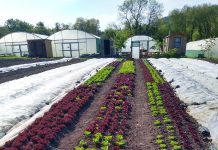March is a time of optimism when light levels increase, days finally become as long as nights at the Equinox and every so often the sun comes out.
Every week increases the chance of a precious vegetable seed making a strong start in soil that is still cold, and they will appreciate any help you give them.
Large seed such as potatoes, peas and broad beans all make a good start in March. We plant first earlies under fleece in February. They take a while to come up, but cropping will be earlier, so long as badgers allow you to keep the fleece over them until frosts have gone.
Fleece is cheap to buy and so long as carefully handled, kept on the ground with smooth soft wood such as old fencing stakes, lasts three or more years.
Early March is a good time to sow your 2nd earlies, again under fleece. Dig a hole with a small spade, and then spit plant with the spade 4” below that. This makes earthing up easier later. The easiest way of earthing up is with compost if you have enough, which also feeds the plant.
Growing 2nd earlies rather than maincrop varieties means they are ready before blight and slugs get going, avoiding the need to spray with organophosphates. And you can transplant another crop straight after them, such as beetroot, swede, French beans and kale.
Peas and beans also yield best from sowing in March and, unlike potatoes, can withstand some frost. Again, fleece gives you a stronger start and keeps rooks and pigeon off. We have a strong colony of pigeons that love pea shoots and last year had to hang Enviromesh over the wire netting we grow them up.
These three crops take a lot of room, but you can grow another crop after them, as above. Or try planting a few squash plants next to them in June, as squash only really get going in August, they then cover the ground well.
Other outdoor sowing hopefuls in March are summer cabbage, calabrese, beetroot and carrots. You are taking a gamble, and may have to sow again in April, but it is worth a try.
Our greenhouse fills up with modules and seed trays this month, ready for planting out in April and May when growth is stronger. And what do birds need when they are unwell? A tweetment.








